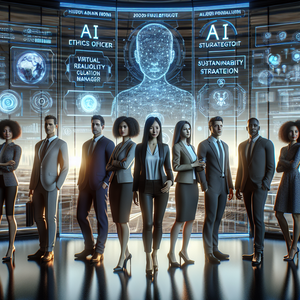The Post-CEO Era: Exploring a Future of AI-Driven Leadership

Artificial intelligence has already proven its value in corporate decision-making, demonstrating the ability to process and analyze data at speeds and scales far beyond human capacity. Tools like machine learning algorithms, natural language processing, and predictive analytics are revolutionizing business operations across industries. AI systems can optimize supply chains, forecast market trends, and provide real-time insights into customer behavior—all tasks that were once the exclusive domain of human executives. In the context of a CEO’s role, AI could theoretically handle responsibilities like resource allocation, risk assessment, and long-term strategic planning. Unlike humans, AI systems are not prone to emotional biases, fatigue, or subjective decision-making. For instance, an AI-driven system could analyze historical sales data, economic indicators, and industry trends to propose an optimal business expansion strategy. With precision, objectivity, and consistency, AI could streamline decision-making processes, enabling companies to respond to challenges and opportunities more efficiently. Consider the case of JPMorgan Chase’s COIN (Contract Intelligence) program, an AI tool that processes complex legal documents in seconds—a task that previously took thousands of human lawyer-hours. Or Amazon’s AI-driven supply chain systems, which optimize inventory and delivery logistics in real-time. These examples highlight AI’s potential to revolutionize not just operational processes but also strategic decision-making, making the idea of an AI-driven CEO seem increasingly plausible.
Ethical Dilemmas in a Post-CEO World
Despite the potential efficiencies AI could bring to corporate leadership, transitioning to AI-led leadership presents significant ethical challenges. A CEO is not merely a decision-maker but also a figure responsible for the consequences of those decisions. In a world where AI systems are at the helm, who—or what—would be held accountable for missteps? For example, imagine an AI-driven CEO making a decision to close a factory, resulting in thousands of job losses. If the decision is based purely on data-driven efficiency metrics, how do we address the moral and social implications of that choice? Who answers to shareholders, employees, or regulators when the decision sparks public outrage? These questions are not just theoretical; they underscore the complexity of using AI in leadership roles. Another concern is the inherent bias in AI systems. AI algorithms are only as good as the data they are trained on, and if that data contains biases—racial, gender, or otherwise—the AI may perpetuate these inequalities. For instance, an AI system tasked with hiring decisions could unintentionally favor certain demographics if historical hiring data reflects discriminatory practices. Ethical oversight would be essential to ensure that AI leadership systems prioritize fairness and inclusivity alongside efficiency. Moreover, there is the inherent risk of AI systems prioritizing profitability over broader societal concerns. Without human empathy or ethical judgment, AI may make decisions that maximize short-term gains but harm long-term sustainability, employee well-being, or environmental health. These ethical dilemmas highlight the need for robust frameworks to govern the use of AI in leadership.
The Human Need for Leadership
While AI offers unparalleled efficiency and objectivity, leadership is about more than just making decisions. Humans look to leaders for vision, inspiration, and emotional connection—qualities that AI, no matter how advanced, struggles to replicate. A CEO is often the public face of an organization, embodying its values and driving its culture. Can an AI-driven system inspire employees, build trust with stakeholders, or navigate the emotional complexities of a crisis? Consider the legacy of iconic human leaders. Steve Jobs’ visionary leadership at Apple, Sheryl Sandberg’s empathetic approach at Meta (formerly Facebook), and Satya Nadella’s cultural transformation of Microsoft all demonstrate the uniquely human qualities that define successful leadership. These leaders did more than analyze data; they connected with people, inspired innovation, and adapted to challenges in ways that cannot be easily programmed into an algorithm. Furthermore, the role of a CEO often extends beyond the boardroom. CEOs frequently engage with governments, media, and the public, acting as ambassadors for their organizations. The ability to communicate effectively, show empathy during crises, and rally people around a common purpose requires a level of emotional intelligence that AI has yet to achieve.
A Hybrid Model: The Best of Both Worlds?
Rather than fully replacing human CEOs, the future of corporate leadership may lie in a hybrid model that combines AI-driven decision-making with human oversight. In this scenario, AI systems could handle data-intensive tasks, optimize operations, and provide actionable insights, while human leaders focus on strategy, vision, and interpersonal dynamics. This collaborative approach could enable organizations to harness the best of both worlds: the precision and efficiency of AI and the creativity and empathy of human leaders. For example, an AI system could identify emerging market opportunities, while a human CEO evaluates the broader cultural and ethical implications of entering that market. Similarly, during a crisis, AI could analyze potential outcomes of different responses, while the human leader communicates the chosen course of action with empathy and clarity to stakeholders. This partnership would allow organizations to make smarter, more informed decisions without losing the human touch that makes leadership meaningful. Several companies are already experimenting with this approach. For instance, Bridgewater Associates, one of the world’s largest hedge funds, uses AI to assist in key decision-making processes while retaining human oversight. This model demonstrates the potential for AI to augment rather than replace human leadership, offering a glimpse into the future of corporate governance.
The concept of a Post-CEO Era, where AI systems take on leadership roles, is no longer confined to science fiction. As AI continues to advance, its potential to transform corporate leadership becomes increasingly clear. The benefits—enhanced efficiency, data-driven decision-making, and reduced bias—are undeniable. However, the ethical dilemmas, risks of bias, and the uniquely human need for connection and inspiration present significant challenges to fully automating leadership. Rather than viewing AI and human leadership as mutually exclusive, the future likely lies in collaboration. A hybrid model, where AI complements human leaders, offers the most promising path forward. By leveraging the strengths of both, organizations can navigate the complexities of the modern world while retaining the humanity that makes leadership truly impactful. As we approach this new frontier, one thing is certain: the role of leadership is evolving. Whether through AI-driven systems, human ingenuity, or a combination of both, the future of leadership will require adaptability, ethical vigilance, and a commitment to balancing innovation with humanity. The Post-CEO Era may indeed be closer than we think, but its ultimate shape will depend on how we choose to embrace and integrate this transformative technology.
AI Ethics Consultant
Large tech firms like Google, IBM, and Microsoft, as well as consulting firms working with AI adoption
Responsibilities & Requirements
Develop ethical frameworks for the use of AI in corporate decision-making, ensuring fairness, transparency, and accountability.
Evaluate AI models for potential biases, particularly in hiring, resource allocation, or other high-stakes applications.
Collaborate with legal, HR, and technical teams to align AI deployment with regulatory guidelines and corporate values.
Requires expertise in AI technologies, data ethics, and familiarity with frameworks like GDPR or AI Act.
Chief AI Strategist
Fortune 500 companies, AI startups, and large consulting firms like McKinsey or Accenture
Responsibilities & Requirements
Define and oversee the strategic implementation of AI technologies to drive organizational goals, such as operational efficiency or market expansion.
Analyze emerging AI trends and assess their potential impact on business models and competitive landscapes.
Lead cross-functional teams to integrate AI into existing workflows, ensuring alignment with long-term business objectives.
Requires deep knowledge of machine learning, business strategy, and experience in leading digital transformation initiatives.
AI Governance Specialist
Financial institutions, healthcare organizations, and global corporations adopting AI governance practices
Responsibilities & Requirements
Establish policies and governance structures to oversee the ethical use of AI within an organization, balancing innovation with risk management.
Monitor compliance with AI-related regulations, such as data privacy laws, and create internal review protocols for AI systems.
Work closely with data scientists and leadership teams to ensure AI systems are interpretable and accountable.
Requires experience in compliance, risk management, and technical fluency in AI/ML systems.
AI Product Manager (Leadership Tools)
Technology firms specializing in enterprise software, like Salesforce, Oracle, or startups in AI decision-support systems
Responsibilities & Requirements
Manage the development of AI-driven tools designed for executives, such as decision-support systems, predictive analytics dashboards, or strategic planning platforms.
Gather and prioritize user requirements from C-suite executives to ensure tools meet leadership needs for efficiency and insight.
Collaborate with data scientists, engineers, and designers to develop user-friendly solutions powered by advanced AI.
Requires a background in product management, familiarity with AI/ML, and understanding of corporate leadership workflows.
Organizational Change Consultant (AI Integration)
Consulting firms like Deloitte and PwC, or in-house transformation teams at large enterprises
Responsibilities & Requirements
Guide organizations through the cultural and operational challenges of adopting AI-driven tools in leadership and decision-making roles.
Develop training programs to help executives and employees understand and trust AI systems.
Assess organizational readiness for AI integration and propose phased implementation strategies to maximize adoption success.
Requires expertise in change management, organizational behavior, and familiarity with AI-driven technologies.


